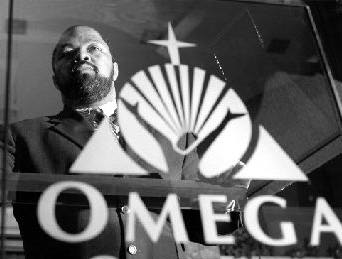
RELIGION
Churches can offer guidance, vision
Some local churches work to revitalize poorer neighborhoods.

Published: Wednesday, April 8, 1998
By Charlise Lyles Dayton Daily News
On a March Sunday, the Rev. Vanessa Oliver Ward, minister of religious education at Omega Baptist Church, preached that the church ought to start a school as a portal to the Promised Land for black children. The vision would be carried out by the Omega Community Development Corporation.
"We've got a history, people, of yelling and hollering, and not showing any results," Ward said. "People have watched us. Hollering has got to have some power behind it."
In the 30 years since Martin Luther King Jr.'s death, the church remains black America's guiding light of leadership. From the pulpit, ministers urge people to vote, rally people around critical issues and denounce acts that hurt black residents.
 The Rev. Daryl Ward is pastor of the Omega Baptist Church.
The Rev. Daryl Ward is pastor of the Omega Baptist Church.DDN photo by Skip Peterson. |
In the 1960s, churches took the lead in the fight for civil rights. Now some local churches work to revitalize poorer neighborhoods.
Four years ago, Greater Allen A.M.E. Church launched the Ecumenical Neighborhood Development Corp. along with Tabernacle Baptist, Mount Enon Baptist and Bethel Baptist. So far, ENDC has purchased and rehabilitated 15 houses in the Fifth Street and Paul Laurence Dunbar Street area. And it has partnered with the St. Mary's Development Corporation and the Southwest Priority Board to build a 144-unit, $8.7 million three-story senior citizens building, and a $4 million 50-cottage complex on Hoover Avenue, said the Rev. Earl Harris of Greater Allen. The non-profit corporations can draw on public, private and non-profit funding sources. ENDC has a full-time director, while church members serve on its board and help with daily operations.
Yet, some criticize that in recent decades the black church has dodged leadership on social and economic issues.
Paul Griffin, chairman of the Wright State University religion department, said, "the churches sometimes are not eager to step forward and confront issues because their members are a younger generation who have obtained some measure of success and do not see the need to be proactive. "In many cases, young people leading churches are emphasizing spirituality without a sociology of racial uplift."
Church-based groups such as the Dayton-based IMA and the local Southern Christian Leadership Conference remain in the forefront on civil rights and community service issues.
Most recently the IMA has publicly questioned the crop of drugstores, such as Rite Aid, Revco and Walgreens, that are being built in areas such as Philadelphia Drive and Salem Avenue.
And blacks say they look to the church to lead in racial reconciliation via groups such as the Vineyard and Promise Keepers.
"The strong black church provides a spiritual, economic and political power base for blacks so we can relate and speak with authority to other groups on a spiritual and social plane," said Omega's Pastor Daryl Ward.